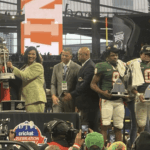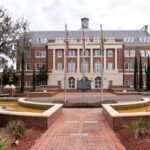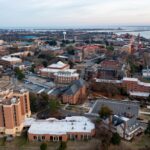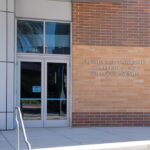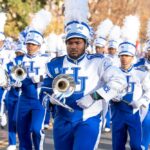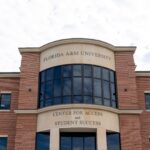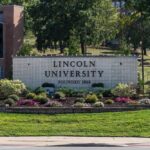
Strategic campus locations create unprecedented professional pathways for students
While traditional college rankings focus on test scores and graduation rates, seven Historically Black Colleges and Universities have quietly redefined success through a different metric: proximity to power. These institutions have transformed the academic experience by positioning students at the heart of America’s corporate ecosystem, where classroom theories meet C-suite realities.
The strategic placement of these universities within major business corridors has created what education experts call “immersive career laboratories.” Students don’t simply study corporate America — they live within it, building professional networks before they graduate and gaining insights that traditional textbooks cannot provide.
This geographic advantage represents more than convenience. It’s a calculated approach to education that recognizes modern careers require more than academic credentials. Today’s graduates need relationships, industry knowledge and practical experience that only comes from direct exposure to corporate environments.
Howard University
In Washington, D.C., Howard University students navigate a unique landscape where government contracts intersect with Fortune 500 operations. Amazon’s HQ2 sits within reach of campus, alongside established corporate giants like Marriott International and Lockheed Martin.
The nation’s capital offers Howard students access to an ecosystem that extends beyond traditional corporations. Government contractors, consulting firms and international organizations provide internship opportunities that span multiple industries. Students regularly secure positions at Booz Allen Hamilton and similar firms, gaining security clearances that position them for immediate post-graduation employment.
This proximity creates networking opportunities unavailable elsewhere. Howard students attend industry conferences, policy briefings and corporate events that shape national business discussions, building relationships with decision-makers who remember them when hiring decisions arise.
Spelman College
Atlanta’s transformation into the Southeast’s business capital has directly benefited Spelman College students. Home to Coca-Cola, Delta Air Lines and Home Depot headquarters, the city provides an ideal environment for women seeking corporate leadership roles.
Spelman’s relationship with Atlanta’s corporate community extends beyond traditional recruiting. Companies regularly collaborate on research projects, invite students to executive advisory boards and create specialized mentorship programs. These partnerships provide students with insider perspectives on corporate strategy and industry trends.
The city’s emphasis on minority business development creates additional advantages for Spelman entrepreneurs. Students participate in pitch competitions judged by Fortune 500 executives, receiving feedback that shapes their business concepts and professional development.
North Carolina A&T State University
Greensboro’s emerging technology sector has created natural partnerships with North Carolina A&T State University’s engineering programs. Companies like Honda Aircraft Company and VF Corporation provide students with cooperative education experiences that go beyond traditional internships.
These co-op programs place students within corporate environments for extended periods, allowing them to contribute meaningfully to ongoing projects while earning academic credit and professional compensation. The arrangement benefits both parties: students gain practical experience while companies access emerging talent and fresh perspectives.
Research collaborations between the university and local corporations have produced patent applications and commercialized technologies. Students often find their names on research publications alongside corporate scientists, creating professional credentials before graduation.
Hampton University
Virginia’s Hampton Roads region provides Hampton University students with unique opportunities in aerospace and defense contracting. Huntington Ingalls Industries, one of America’s largest shipbuilding companies, maintains extensive partnerships with the university’s engineering programs.
The proximity to Norfolk Naval Station creates pathways into government contracting that require specialized knowledge of federal procurement processes. Hampton students regularly obtain security clearances during their undergraduate years, positioning them for immediate employment in sensitive government projects.
The university’s business school has developed specialized curricula that prepare students for careers bridging corporate management and government contracting—a niche field requiring both business acumen and regulatory expertise.
Texas Southern University
Houston’s status as America’s energy capital provides Texas Southern University students with insider access to an industry that drives significant portions of the national economy. ExxonMobil, Chevron and ConocoPhillips headquarters create internship opportunities spanning traditional operations and renewable energy initiatives.
Students gain exposure to industry transformation as energy companies navigate climate change pressures and sustainability requirements. This perspective on energy transition gives Texas Southern graduates unique insights into corporate adaptation strategies.
University partnerships with energy companies extend into research collaborations focused on environmental remediation and alternative energy sources. Students contribute to projects addressing climate change while maintaining economic viability for corporate partners.
Strategic partnerships transform traditional education
These universities demonstrate how geographic positioning amplifies educational impact beyond conventional measures. Students graduate with professional networks extending far beyond alumni associations, having built relationships with corporate executives and industry leaders during their undergraduate years.
Corporate proximity provides real-time market intelligence about industry trends, hiring practices and skill requirements. Students adjust their academic focus and extracurricular activities based on insights gained through direct corporate exposure, ensuring their education remains relevant to evolving market demands.
Many corporate partnerships result in job guarantees for high-performing students, eliminating uncertainty associated with traditional job searches. Students can focus on academic excellence knowing employment opportunities await upon graduation.
HBCU innovation reshapes higher education models
These seven institutions have redefined educational value by recognizing that learning extends beyond classroom walls. Their strategic locations transform every student interaction into potential career advancement, making these universities powerful catalysts for professional success.
The model challenges traditional university rankings that emphasize standardized metrics over practical outcomes. These HBCUs prove that institutional value can be measured through graduate employment rates, starting salaries and career advancement speed — metrics that reflect real-world success.
As other universities struggle with employment outcomes for graduates, these strategically positioned HBCUs demonstrate how thoughtful geographic planning can create sustainable competitive advantages. Their success suggests that higher education’s future may depend less on prestige rankings and more on practical preparation for professional success.
The transformation of these seven institutions from traditional colleges into corporate gateway universities represents an evolution in higher education philosophy. By embracing their geographic advantages, they have created educational experiences that prepare students not just for careers, but for leadership roles in America’s evolving business landscape.
Sort By
 Register for exclusive access to VIP events and more
Register for exclusive access to VIP events and more
Sign up for periodic updates, special discounts, and more!




